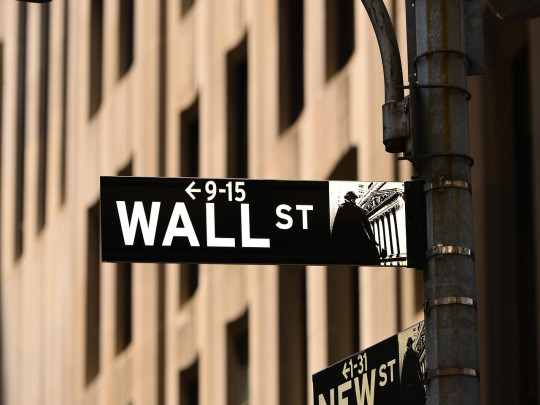Stock Market Update: Levi Strauss Soars, Bitcoin Hits New Highs, Trump Tariffs Hit Canada and Shake Markets
Stock Market Update: Levi Strauss jumped on strong earnings and guidance. Bitcoin and Ether surged to record highs amid ETF inflows. Trump’s 35% Canada tariff rattled iShares Canada ETF, Cameco, and TD Bank. AMC and Performance Food Group also made big moves.

- Early Friday US stock futures fell from record highs after President Trump announced a new 35% tariff on Canadian imports, reigniting trade war concerns.
- The pullback follows a record-setting session Thursday, where the S&P 500 and Nasdaq closed at all-time highs, and Nvidia briefly became the first public company valued at $4 trillion.
- Significant premarket movers Friday included Levi Strauss (+7%) jumping on a strong Q2 beat and raised guidance. Performance Food Group (+8%) surged on takeover interest reports. Bitcoin hitting a new all-time high lifted crypto stocks like Coinbase (+1%). Canadian stocks fell on the new tariff announcement. Defense stocks gained on a drone production order.
- President Trump announced a 35% tariff on all Canadian imports, effective Aug 1, linking the move to fentanyl smuggling. Canada immediately announced retaliatory tariffs on over $20B of US goods. Trump also hit Brazilian copper with a 50% tariff.
- Economic news included a top White House official launching a fresh critique of Fed Chair Powell. The UK economy contracted for a second straight month in May. Fed Governor Waller indicated more balance sheet reduction is likely.
- In company news, Levi Strauss raised its guidance despite tariff concerns. Analysts warned a potential 200% tariff on pharmaceuticals, which Trump has floated, would be devastating to the industry.
- Global markets Friday saw Europe fall after Trump hinted the EU could be next for tariffs. Asia closed mixed.
- US Treasury yields rose Friday morning (10-year around 4.387%) in reaction to the escalating trade tensions.
- Gold prices rose for a third day on safe-haven demand. Oil was slightly higher. Bitcoin surged to a new all-time high above $118,000, fueled by record ETF inflows and massive short liquidations.
- Market sentiment soured Friday as Trump's surprise tariffs on Canada and Brazil shattered recent trade optimism and tested the market's AI-driven resilience.
Stock futures fell on Friday, retreating from record-setting highs reached just a day earlier, after President Donald Trump escalated trade tensions by announcing a 35% tariff on Canadian imports and signaling more tariffs could be on the way. The tariff surprise sparked a wave of risk-off sentiment in early trading, leading to broad-based selling across sectors.
The S&P 500 and Nasdaq Composite had both closed at all-time highs on Thursday, powered by ongoing enthusiasm around artificial intelligence and chipmakers. Nvidia, which surged nearly 2% to become the first public company valued at $4 trillion, remained a focal point of the rally. Shares of the semiconductor giant gained another 0.8% Thursday but were down in premarket trading Friday as profit-taking set in across tech names.
Despite the Friday pullback, both the S&P 500 and Nasdaq are on pace for a positive week, underscoring the market’s underlying resilience in the face of geopolitical and economic uncertainty. The Dow Jones Industrial Average, however, is on track to end the week slightly lower, off about 0.4%. In early action Friday, JPMorgan led financials lower, with the banking giant down around 1% in the premarket, as investors digested the broader implications of heightened trade risks.
US Market Previous Day:
The S&P 500 climbed 0.27% on Thursday to close at a fresh all-time high of 6,280.46, as investors continued to lean into equities despite mounting trade tensions. The Nasdaq Composite also registered a record close for the second consecutive session, rising 0.09% to end at 20,630.67. The Dow Jones Industrial Average gained 192.34 points, or 0.43%, finishing at 44,650.64.
US Futures in Red:
- Dow Jones Industrial Average futures declined by 0.61%
- S&P 500 futures showed losses of 0.55%
- Nasdaq Composite futures fell by 0.47%.
Biggest Premarket Movers
- Levi Strauss: The denim apparel stock rose 7% after its second-quarter results surpassed expectations. Levi Strauss reported adjusted earnings of 22 cents per share on $1.45 billion of revenue, beating LSEG analyst estimates of 13 cents per share and $1.37 billion, respectively. The company also announced a dividend increase and raised its full-year guidance on several key metrics.
- Coinbase, MicroStrategy: Shares of Coinbase and MicroStrategy added 1% and 3%, respectively, as the price of bitcoin reached a new all-time high on Friday. The flagship cryptocurrency surged above $118,000 after bitcoin ETFs recorded their largest single day of inflows for the year.
- BP: Shares were flat in premarket trading after the energy giant provided a mixed update for its second quarter. While the company said its oil trading division should post strong results and it expects higher upstream production, it also warned that lower oil and gas prices would negatively impact its performance. BP estimated that lower oil and gas sales could hurt earnings by as much as $800 million and up to $300 million, respectively.
- AMC Entertainment: The movie theater chain popped 7% in premarket trading following an upgrade to "outperform" from "neutral" by Wedbush. The firm stated that AMC is poised to benefit from a more consistent film release slate over the coming quarters. Wedbush also highlighted that the company is completing what could be its last major share issuance for the foreseeable future, removing a significant headwind for the stock.
- Canadian stocks: The iShares MSCI Canada ETF (EWC) fell 0.5% after President Donald Trump announced a 35% tariff on Canadian imports into the U.S. In response to the news, Canada-based uranium miner Cameco and TD Bank were also trading lower in the premarket.
- Performance Food Group: Shares rallied 8% after a Bloomberg News report, citing people familiar with the matter, indicated that U.S. Foods is considering a takeover of the food distributor.
- AeroVironment, Kratos Defense & Security: Shares of AeroVironment and Kratos gained more than 4% each. The advance came after Defense Secretary Pete Hegseth ordered the Pentagon to fast-track the production of drones.
Tariff Update:
U.S. President Donald Trump escalated trade tensions on Thursday by announcing a sweeping 35% tariff on Canadian imports, effective August 1. The move came in response to what he described as retaliatory measures from Ottawa, with Trump criticizing Canadian Prime Minister Mark Carney in a publicly posted letter on Truth Social. In the letter, Trump tied the tariff hike to Canada’s alleged failure to cooperate on curbing fentanyl smuggling, stating that a reduction in the tariff could be considered if Canada takes steps to halt the flow of the synthetic drug.
The new 35% duty will be separate from existing sector-specific tariffs that Canada already faces under the Trump administration. These include a 50% tariff on Canadian steel and aluminum, 25% on automobiles, and a soon-to-be-enforced 50% levy on copper. Many other Canadian imports are currently subject to a 25% blanket tariff imposed earlier this year, though certain goods remain exempt under the United States-Mexico-Canada Agreement (USMCA). Energy imports from Canada continue to attract a lower 10% levy.
In response, Canada said it would retaliate with 25% tariffs on over $20 billion worth of U.S. goods, also effective Thursday. Finance Minister Dominic LeBlanc detailed the measures at a press conference, saying the tariffs would apply to products such as computers, cast iron goods, and sports equipment, in addition to steel and aluminum. These new duties add to the 25% countermeasures Canada implemented in March on $30 billion worth of U.S. imports—tariffs that remain in place despite earlier U.S. exemptions following a stock market slump.
Trump also expanded his tariff campaign beyond North America. On Wednesday night, he announced a 50% levy on imported copper from Brazil, citing both the country’s “unfair” trade practices and political developments surrounding the trial of former Brazilian President Jair Bolsonaro. Brazilian President Luiz Inácio Lula da Silva responded by vowing to take retaliatory measures under the country’s economic reciprocity laws. The iShares MSCI Brazil ETF (EWZ) dropped 1.6% on Thursday following the news.
These developments follow a week of heightened trade tensions, during which Trump issued letters to at least 14 countries outlining new tariffs set to begin August 1. On Thursday, he further floated plans for blanket tariffs of 15% to 20% on most U.S. trading partners, up from the existing 10%, while brushing aside concerns that such measures could reignite inflationary pressures.
Key Economic Data/News:
President Donald Trump’s top budget official, Russell Vought, launched a sharp critique of Federal Reserve Chairman Jerome Powell on Thursday, accusing him of mismanagement and misleading Congress regarding a costly renovation project for the central bank’s headquarters. Vought labeled the renovation "ostentatious" and questioned Powell’s fiscal stewardship, suggesting potential grounds for dismissal. While the president cannot easily remove a Fed chair, a recent Supreme Court ruling clarified that members of the Federal Reserve Board enjoy unique protections from politically motivated firings, raising legal hurdles for any direct action Trump might take.
Meanwhile, the United Kingdom’s economy shrank for a second consecutive month in May, reflecting the drag from U.S. tariffs and ongoing business uncertainty. According to the Office for National Statistics, U.K. GDP contracted 0.1% month-on-month, underperforming economists’ expectations for a modest gain. The decline followed a sharper 0.3% contraction in April and was driven by broad-based weakness, including a 0.9% drop in industrial production and a 0.6% decline in construction activity. The disappointing figures pose a challenge for Finance Minister Rachel Reeves, who has prioritized reviving growth and addressing the fiscal deficit amid a tough global environment.
On the monetary policy front, Federal Reserve Governor Christopher Waller said Thursday that the Fed likely has more room to reduce its balance sheet as part of its ongoing quantitative tightening program. The Fed’s total assets have fallen to $6.7 trillion from a peak of nearly $9 trillion reached during the pandemic, but remain well above pre-Covid levels. Waller indicated that further reductions are both feasible and necessary, estimating that the balance sheet could ultimately shrink to around $5.8 trillion while still maintaining adequate reserves for the banking system. His remarks suggest the Fed remains committed to gradually tightening financial conditions through asset runoff, even as markets focus on interest rate decisions and inflation dynamics.
Earnings Season/Company News:
Levi Strauss raised its full-year guidance on Thursday, demonstrating resilience amid the latest wave of tariffs imposed by the Trump administration. The denim giant’s updated outlook factors in a 30% tariff on goods from China — though only about 1% of its products are sourced there — and a 10% duty on imports from the rest of the world. CEO Michelle Gass expressed confidence in the company’s ability to absorb these costs, citing strong business fundamentals. She noted that Levi’s has been gradually scaling back on promotional activity, driving more full-price sales. Additionally, new product innovations and fits are being priced at a premium, with strong consumer uptake. These trends, according to Gass, are helping offset the tariff headwinds and supporting the company’s improved performance outlook.
The pharmaceutical industry, however, is facing far more serious concerns. President Trump’s floated 200% tariff on pharmaceutical imports has sent shockwaves through the sector. Though implementation is not expected immediately, with a potential grace period of 12 to 18 months, the threat alone has sparked urgent scenario planning. Analysts from UBS warned that such a steep tariff would slash profit margins, especially for firms heavily reliant on overseas manufacturing. The Pharmaceutical Research and Manufacturers of America (PhRMA) sharply criticized the proposal, warning of a $51 billion annual increase in U.S. drug prices if even a 25% tariff were passed on to consumers. They argued the tariffs would be “counterproductive” to healthcare outcomes, burdening patients with significantly higher costs.
Global Market Trends:
Global equity markets reflected growing nervousness around trade tensions, especially in Europe. The pan-European STOXX 600 index fell on Friday as investors digested President Trump’s announcement that the European Union may receive a tariff notification letter imminently. The development clouded progress in transatlantic trade talks, pulling European bank stocks lower and dampening market sentiment. Despite the dip, the index remained on track to post a modest weekly gain. ECB board member Isabel Schnabel, in an interview, stated that the threshold for another interest rate cut was "very high," noting that euro zone inflation remains anchored around 2% and the economy is faring better than anticipated.
In Asia, markets closed mixed heading into the weekend. Japan’s Nikkei 225 edged down 0.19% to 39,569.68, while the broader Topix index rose 0.39% to 2,823.24. South Korea’s Kospi dipped 0.23% to 3,175.77, though the Kosdaq added 0.35% to finish at 800.47. Australia’s S&P/ASX 200 slipped 0.11% to 8,580.1. Meanwhile, mainland China’s CSI 300 posted a modest gain of 0.12%, ending the day at 4,014.81.
Debt Market:
U.S. Treasury yields moved higher on Friday, reflecting heightened investor uncertainty following President Donald Trump’s announcement of new 35% tariffs on Canadian imports. The 10-year Treasury yield rose 4 basis points to 4.387%, while the 30-year yield increased 5 basis points to 4.914%. The 2-year yield also ticked up by 2 basis points to 3.887%. Investors are digesting the week’s wave of tariff-related developments and positioning ahead of the Federal Reserve’s monthly budget statement due later in the day. Attention is also turning to June inflation data, scheduled for release next week, which could influence expectations around the Fed’s rate trajectory.
Commodities and Other Assets:
Gold prices extended their rally for a third straight session on Friday, buoyed by renewed demand for safe-haven assets in response to escalating trade tensions. Trump's tariff escalation on Canada, coupled with broader threats aimed at other trading partners, stoked fears of a slowdown in global economic activity. This environment, paired with increasingly dovish commentary from Federal Reserve officials, has lifted gold. Fed Governor Christopher Waller reiterated that a rate cut could come as early as this month, and San Francisco Fed President Mary Daly suggested that two cuts remain possible this year. Lower interest rates typically enhance the appeal of non-yielding assets like gold.
Oil prices edged up slightly on Friday, stabilizing after Thursday’s decline amid concerns over the global impact of Trump’s tariff actions. Brent crude was on track for a 1.1% weekly gain, while WTI hovered near unchanged from the previous week. Investors weighed signs of short-term tightness in the physical oil market, largely driven by summer refinery demand and power generation needs, against the International Energy Agency’s revised forecasts pointing to a surplus later this year. The IEA raised its supply growth estimates while trimming demand expectations, a combination that could tip the market into oversupply even as short-term fundamentals remain strong.
Bitcoin surged to new all-time highs on Friday, fueled by a wave of institutional inflows into crypto ETFs and strong momentum from earlier in the week. The flagship cryptocurrency rose 4% to $118,396.01 and briefly touched $118,872.85. Ether also jumped nearly 7%, breaking above $3,000 for the first time since February. Thursday saw a record-setting day for crypto ETFs, with bitcoin funds taking in $1.18 billion — their largest daily inflow of 2025 — and ether ETFs adding $383.1 million. The move followed a release of Fed minutes showing disagreement among officials on the pace of rate cuts, but optimism in tech stocks helped fuel the crypto surge. Additionally, massive short liquidations — over $650 million in bitcoin and $215 million in ether in the past 24 hours — accelerated the rally as leveraged sellers were forced to buy back into the market. For the week, bitcoin is set to finish up nearly 10%, while ether has jumped more than 20%.
Market Sentiment:
The modest gains came amid a backdrop of mixed sentiment, with enthusiasm around artificial intelligence and solid corporate earnings offsetting concerns over escalating tariffs. Market momentum remained supported by strength in large-cap tech and chip stocks, although overall volumes were slightly lighter ahead of key economic data due later in the week.
Investor attention is increasingly turning toward upcoming inflation figures and Federal Reserve commentary, both of which are expected to provide further clarity on the central bank's rate path. While optimism in the AI sector continues to drive leadership in the Nasdaq and support broader equity sentiment, the market remains sensitive to geopolitical developments and trade policy shifts. Uncertainty surrounding U.S. tariff implementations—particularly on key partners like Canada, Japan, and the European Union—has introduced an element of caution, limiting broader risk appetite. Nonetheless, a resilient earnings season and stable macro indicators have helped cushion the downside, keeping major indexes near record levels.



